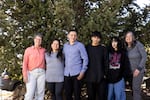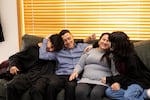
In this March 16, 2024 photo provided by Welcome Corps, Amy Kasari (sponsor) is pictured at left, with Colombian refugees Maria del Carmen Chaparro, Jhon Rodriguez, Sergio and Carolay (Maria's children), and Janet Harris (sponsor). Sponsors are members of the Antioch Church in Bend who formed a Welcome Corps group to work with a refugee resettlement agency to help the family make a new home in Bend.
Courtesy Photo by Jenn Ackerman for Welcome Corps / Ackerman + Gruber
For more than 40 years, the U.S. has brought in refugees from around the world through a handful of resettlement agencies. But now a state department program called Welcome Corps creates a new avenue for refugees. It’s a community-based program where teams of people come together to sponsor families and ease their transition into American life.
That’s how Maria del Carmen Chaparro, her husband and two of her adult children arrived in Bend in December. The family first fled violence in their native Colombia and went to the neighboring country of Ecuador.
“To get refugee status in Ecuador, we had to go through … a process of very intense police interrogations,” she said. “They had to confirm everything that we were saying was actually factual.
Meanwhile in Bend, Amy Kasari, the pastor of hospitality and justice at Antioch Church had heard an NPR story about Welcome Corps, a new state department program that helps refugee families create a new life in American communities. Kasari says she wasn’t surprised how quickly people in her church responded to the volunteer opportunity.
“We work as a church in our community helping folks who are dealing with brokenness in their lives,” she said. “We expand out beyond that … into global strife or issues. So caring for folks who are fleeing violence — it’s right in that space.”
The Bend Welcome Corps group had grown to 40 by the time they were ready to meet del Carmen Chaporro and her family at the airport in December.
Del Carmen Chaporro credits Kasari’s team with how quickly they were able to furnish and settle into a home, join a faith community and — importantly — find work for all four family members.

Jhon Rodriguez and Maria del Carmen Chaparro, center, and children Sergio and Carolay are pictured in their home in Bend on Saturday, March 16, 2024.
Courtesy Jenn Ackerman / Ackerman + Gruber
“I feel at home here, very much so. So I’m really happy because we’re able to find places where we can all work,” del Carmen Chaporro said. “I work in a hospital. My husband works in a cleaning agency. My son works in a call center and my daughter works with the Latin community. And so knowing that we all have business to do and stable work, that’s really what’s changed our lives.”
Del Carmen Chaparro’s oldest child is 22 and is still in Ecuador. She’s hopeful that he will be able to join the family in Bend soon.
The work isn’t all on community members, though. Resettlement agencies that have traditionally worked directly with refugees are still involved in the process. The Bend group made up of members of the Antioch Church checked in regularly with the International Rescue Committee (IRC) throughout 2023 to get advice and guidance.
Una Bilic is the Deputy Director for New Resettlement Pathways at the International Rescue Committee and came to the U.S. as a refugee herself from the former Yugoslavia when she was 10 years old.
“I think of my refugee experience and how much I wanted to give back,” she said. “I tried as hard as I possibly could to provide that one-on-one support to provide that understanding and care that is needed in the refugee resettlement work.”
But Bilic says her capacity is limited for any one individual or family. She says the group in Bend demonstrates the success of this new model.
“The Welcome Corps model has so great potential to make a profound difference in the lives of many more refugees,” she said. “That shows you that everyday Americans can do this in a group setting with love, care and of course, support and the road to attaining self sufficiency. We can scale this up. It’s all just about getting the word out and recruiting the people who want to do this work.”
For her part, del Carmen Chaparro says she feels reborn, and has expressed an interest in being part of a Welcome Corps group to help other families as she and her family have been helped.
Click here to read this story in Spanish. Haga clic aquí para leer en español.
You can listen to the whole conversation with Maria del Carmen Chaparro, Amy Kasari and Una Bilic on “Think Out Loud” by pressing the play button below.
